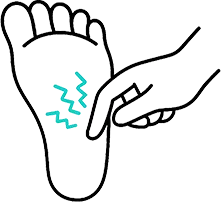
Neuropathy
Step into a new era of healing at Infinity Stem Cells, where cutting-edge science meets the body’s innate potential. Our advanced cell regeneration therapies, centered on mesenchymal stem cells (MSCs), harness the transformative power of cellular renewal to address a wide range of conditions, restoring vitality and igniting wellness from within.
|
|
|
|
|
|
|
What is Neuropathy
Neuropathy, or peripheral neuropathy, refers to damage to the peripheral nerves, which carry signals between the brain/spinal cord and the rest of the body. This condition can affect sensation, movement, and organ function, and is often associated with diabetes, infections, injuries, autoimmune diseases, and certain medications.
Neuropathy can involve one nerve (mononeuropathy), multiple nerves (polyneuropathy), or nerves in specific areas. It commonly affects the hands, feet, legs, or arms, leading to a variety of uncomfortable or disabling symptoms.

What Are the Symptoms?
Neuropathy symptoms can vary greatly depending on which nerves are affected, but common signs include:

Tingling & numbness

Burning or sharp, stabbing pain

Muscle weakness or cramps

Loss of coordination or balance

Extreme sensitivity to touch

Bladder, bowel, or digestive issues
Current Treatments
for Neuropathy
Neuropathy treatment focuses on relieving symptoms, slowing nerve damage, and treating the cause:
Medications: Nerve pain relievers, antidepressants, and topical creams.
Lifestyle Changes: Better blood sugar control, nutrition, and avoiding alcohol.
Physical Therapy: Helps with strength, balance, and daily function.
TENS Therapy: Uses gentle electrical pulses to reduce pain.
Addressing Underlying Issues: Managing conditions like diabetes or autoimmune disorders.
What Are the Outcomes?
Neuropathy outcomes vary by cause and severity. When caught early and properly managed, symptoms can be minimized or even reversed. Chronic cases may persist but can often be controlled with a combination of treatments. Ongoing care helps reduce pain, improve mobility, and enhance daily function, allowing many people to lead active lives.
Stem Cell Therapy for Neuropathy
Stem cell therapy is an emerging, experimental approach being studied for neuropathy, especially in diabetic and nerve injury-related cases. This treatment involves injecting mesenchymal stem cells (MSCs) to repair damaged nerves, reduce inflammation, and promote healing.
Potential Benefits:
Stimulates nerve regeneration
Reduces inflammation and pain
May restore nerve function in early to moderate cases
Could delay or reduce reliance on long-term medication
Although promising, stem cell therapy for neuropathy is still under clinical research and not yet a standard treatment. Patients should consult medical professionals and explore participation in approved clinical trials.
Science, Simplified: Our Therapy Process
It’s important to note that stem cell therapy for autism is still experimental, and not approved as a standard treatment. Families should consult healthcare professionals and thoroughly research clinical trial options.
Site
Target
Depth
Forehead & Eyes
Cheeks & Jawline
Under-Eye Area
Full Face
Wrinkles, crow’s feet
Volume loss, elasticity, hydration
Dark circles, fine lines
Texture, glow (via microneedling)
1–2 mm (superficial dermis)
2–4 mm (deep dermis)
1–1.5 mm (cautious use)
0.5–1.5 mm

Why Consider
Stem Cell Therapy?
Non-surgical and outpatient
Focuses on long-term healing, not just symptom relief
Supported by early-stage clinical research
Ethically sourced, high-quality regenerative cells
Find Out If You're a Candidate >>
Talk to an Expert >>
Explore the Science Behind It >>
Frequently Asked Questions
Is this FDA-approved?
Stem cell therapies using ethically sourced regenerative cells are regulated under strict guidelines by the FDA. While certain applications have explicit FDA approval, others are administered under FDA guidelines as investigational therapies, complying fully with regulatory standards to ensure safety and quality.
What are the risks or side effects?
Stem cell therapy is generally safe with minimal risk. Common mild side effects can include temporary soreness, swelling, or minor bruising at the injection site. Rarely, more serious complications such as infections or allergic reactions can occur. Our medical team thoroughly evaluates each patient to minimize these risks.
How long until I feel results?
Patients often notice initial improvements within days to weeks, with more substantial benefits progressively occurring over the following months as the regenerative process continues. Individual experiences can vary depending on the condition's severity and personal health factors.
How many sessions are required?
Many patients experience significant improvements after a single session. However, depending on individual conditions and response to treatment, additional sessions may be recommended to maximize outcomes. Our specialists provide personalized recommendations during your consultation.
Is this covered by insurance?
Insurance coverage varies depending on the specific policy and condition being treated. While regenerative therapies are not universally covered, some plans offer partial or full coverage. Our administrative team will assist you in verifying insurance coverage and exploring financial options to support your treatment.
Connect with Us
Quick Links
Copyright© 2025 Scientific Infinity - All Rights Reserved.
